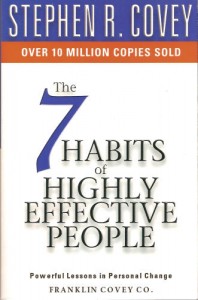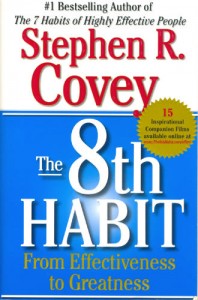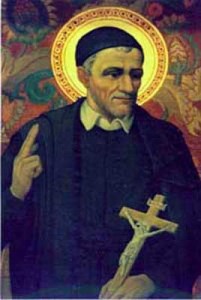Vincent and Stephen R. Covey:
From Time Management to Self Management
Stephen R. Covey authored the international bestseller, The 7Habits of Highly Effective People: Powerful Lessons in Personal Change. More than 15 million copies of the book have sold worldwide since its publication in 1989.
Following the dramatic success of his book, Covey established the “Covey Leadership Center.” The Center merged in 1997 with Franklin Quest to form FranklinCovey, which now offers planning tools and training that incorporate Covey’s insights to individuals and organizations. Covey, who died in 2012, served as a professor in the Jon M. Huntsman School of Business at Utah State University.
Covey spent much of his life studying great corporate and political leaders, and the wisdom about effective leadership found in the world’s philosophies and religions. Based on his research, Covey notes:
“Most of the great cultural shifts – ones that have built great organizations that sustain long term growth, prosperity and contribution to the world – started with the choice of one person….Regardless of their position, these people first change themselves from the inside out. Their character, competence, initiative and positive energy – in short, their moral authority – inspired and lifted others. They possessed an anchored sense of identity, discovered their strengths and talents, and used them to meet needs and produce results” (2004, 25-26).
Among the historic leaders he studied, Covey probably did not include Vincent de Paul; but, he certainly could have been speaking of Vincent in the above quote. Vincent himself once said, “A man is not believed because he is a great scholar, but because we love and esteem him” (Lettres, I, pp. 468-471)
In The 7 Habits and his later books, Principle-Centered Leadership and The 8th Habit, Covey puts forward a new – or rather “reclaimed” – paradigm of leadership. Stated briefly, the paradigm is this: 1) leadership development happens from “inside-out”; 2) effective leadership centers on aligning one’s self and one’s organization with natural principles – valuing those time- tested principles over quick-fix solutions or skills training.
Covey criticizes the popular idea of improving effectiveness through “time management,” and advocates “self management,” which also involves developing skills for working well with others and building strong relationships. “While you can think in terms of efficiency in dealing with time, a principle-centered person thinks in terms of effectiveness in dealing with people” (1989, 161). Covey goes on to speak about the important of self management:
“…the first person you need to consider in terms of effectiveness rather than efficiency is yourself….to understand and center your life on principles, to give clear expression to the purposes and values you want to direction your daily decisions” (1989, 170).
According to Covey, the natural principles which under gird effective leadership include fairness, kindness, respect, honesty, integrity, service, and contribution. “Like the law of gravity, they operate constantly; different cultures may translate them into different practices, or obscure them with the wrong use of freedom” (2004, 47).
 In The 8th Habit, Covey narrows his previously articulated seven habits into three steps to effectiveness and success:
In The 8th Habit, Covey narrows his previously articulated seven habits into three steps to effectiveness and success:
- Building trust;
- Searching for creative solutions;
- Institutionalizing the capacity to fill the needs of society through organization
In addition to his three steps for effectiveness and success, Covey’s leadership model offers eight personal characteristics of a principle-centered leader:
- They are continually learning
- They are service oriented
- They radiate positive energy
- They believe in other people
- They lead balanced lives
- They see life as an adventure
- They are synergistic
- They practice self renewal:
Finally, Covey once offered in a lecture three questions for the servant-leader who hopes to mentor and empower others:
- “What are your goals?”
- “How can I help?”
- “How is it going?”
Vincent’s Steps to Effective Leadership
One can easily think of Vincent de Paul in the context of these three steps to effectiveness and sustainability. Vincent’s enterprises on behalf of the poor all were successful due to his ability to build trust, respond creatively, and organize a consistent and sustainable response to the needs he witnessed around him.
The earliest example of Vincent’s leadership effectiveness is the story of his experience at Chátillon-les-Dombes in France. In 1617, Vincent was serving in the village as a parish priest. One Sunday, while vesting for Mass, a parishioner told Vincent about a family suffering from severe health problems and in desperate need of care. Vincent decided to preach at the Mass about the family’s need.
Fuechtmann tells us that the family lived some distance into the countryside, but later that day as Vincent made his own way on foot toward the family’s house, “he discovered a veritable procession of people from the parish also on the way to provide assistance.” Vincent quickly took stock of the situation: “There is great charity,” he said, “but it is badly organized.” Vincent responded with creativity and organization. Within days, he identified nine women willing to take turns to provide assistance, and provided them with a written plan for how to do it. Before the end of the year, the first Confraternity of Charity (now known as the Ladies of Charity) was officially established.
Fuechtmann’s reflection on the lessons from this story illustrates how Vincent responded using Covey’s three steps to leadership effectiveness. “[Vincent’s] preaching inspired a remarkable response of care-giving on the part of the village. Vincent assessed the spontaneous outpouring of the generosity and organized it for effective and lasting results.”
Vincent Encouraged Principle-Centered Leadership
For Vincentians, Covey’s list of characteristics of a principle-centered leader echoes the words of John Fruend, C.M., in describing the personal attributes promoted by Vincent:
Because it took character to perform Jesus’ mission, character formation was required of the apostle. Building habits of hard work, truthfulness, evenness in mood, doing with less, listening, empathy, steadiness, detachment, readiness to move on, perseverance, humility and the like was essential for following the missionary Jesus. For Vincent, Christian discipleship did not exist in the abstract. It came to life in practical service. (http://www.vincenter.org/vdp-ldm/biov.html)
Vincent as Mentor
Writing about Vincent de Paul as a mentor, Alison Forrestal, offers us this portrait of his approach:
“The Christ of charity was therefore the mentor of Vincent de Paul, who sought to form himself in the mould of compassion, zeal, self-giving and service. This meant that he understood mentoring to function in two ways, beyond the practical organisations of the offices in his charitable infrastructure: firstly, the mentor should act as a living example and inspiration to others; and secondly, they should be devoted to helping others to live up to the ideals set by their supreme mentor Christ”(2007, 10).
Given just the few examples provided here, it seems there is no doubt that Vincentians around the world certainly can take pride in Vincent de Paul as someone who provides a role model for Covey’s contemporary portrait of an effective, principle-centered leader.
Reflection Questions
What actions do you take to build trust among those you lead?
What is one creative way you addressed a situation you encountered in the past month?
What learning goals do you have for yourself in the coming year?
How are you helping others to learn and grow as you lead them?
Resources
Covey, Stephen R. 1989. The 7 Habits of Highly Effective People: Powerful Lessons in Personal Change New York, NY: Simon & Schuster. Used with permission.
_______________. 1991. Principle Centered Leadership. New York, NY: Simon & Schuster. Used with permission.
_______________. 2004. The 8th Habit: From Effectiveness to Greatness. New York, NY: Simon & Schuster. Used with permission.
Forrestal, Alison. “Vincent de Paul as Mentor,” Vincentian Heritage, Vol. 27, No. 2, Chicago, IL: Vincentian Studies Institute. 2007. Used with permission.
Fuechtmann, Thomas G. 2005. “ ‘There Is Great Charity, But’…Vincent de Paul and the Organization of Charity,” in Vincentian Heritage, Vol. 23-25, No. 2, Vol. 26. No. 1. Chicago, IL: Vincentian Studies Institute. 2005. Used with permission.
Edited by Patricia M. Bombard, BVM, D.Min., Director, Vincent on Leadership: The Hay Project, DePaul University, Chicago, IL USA



